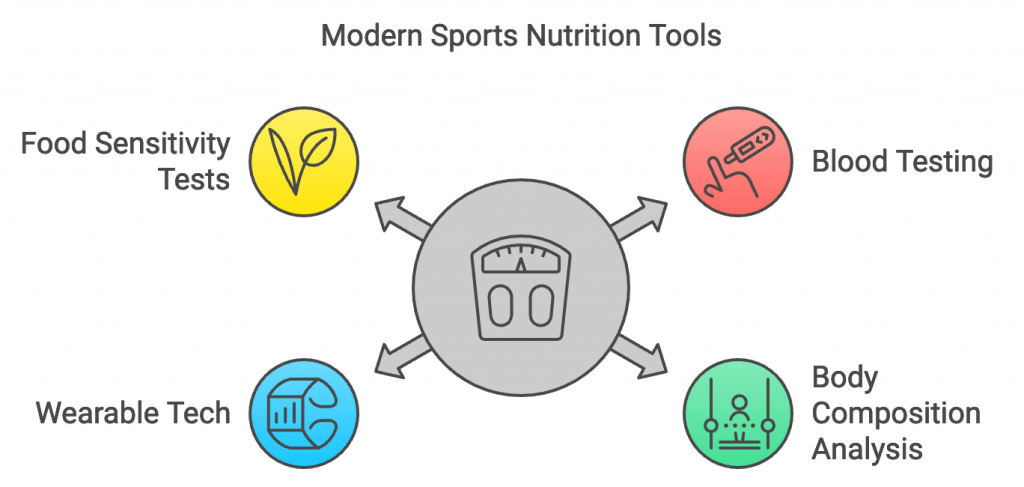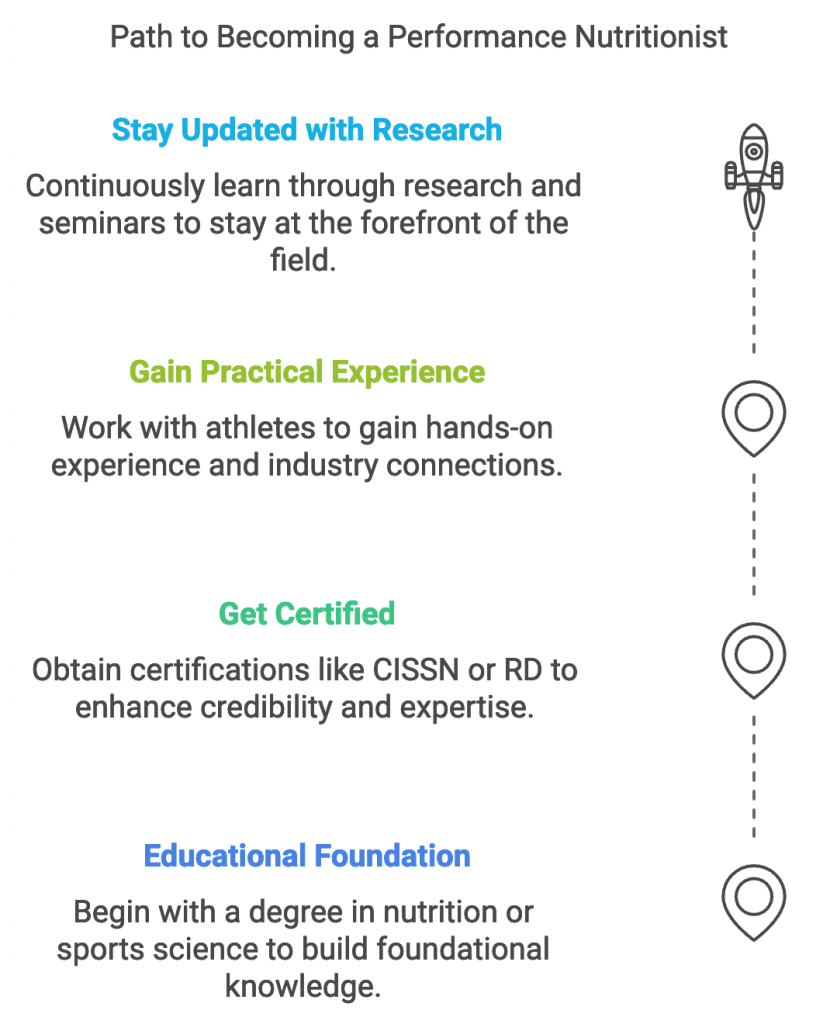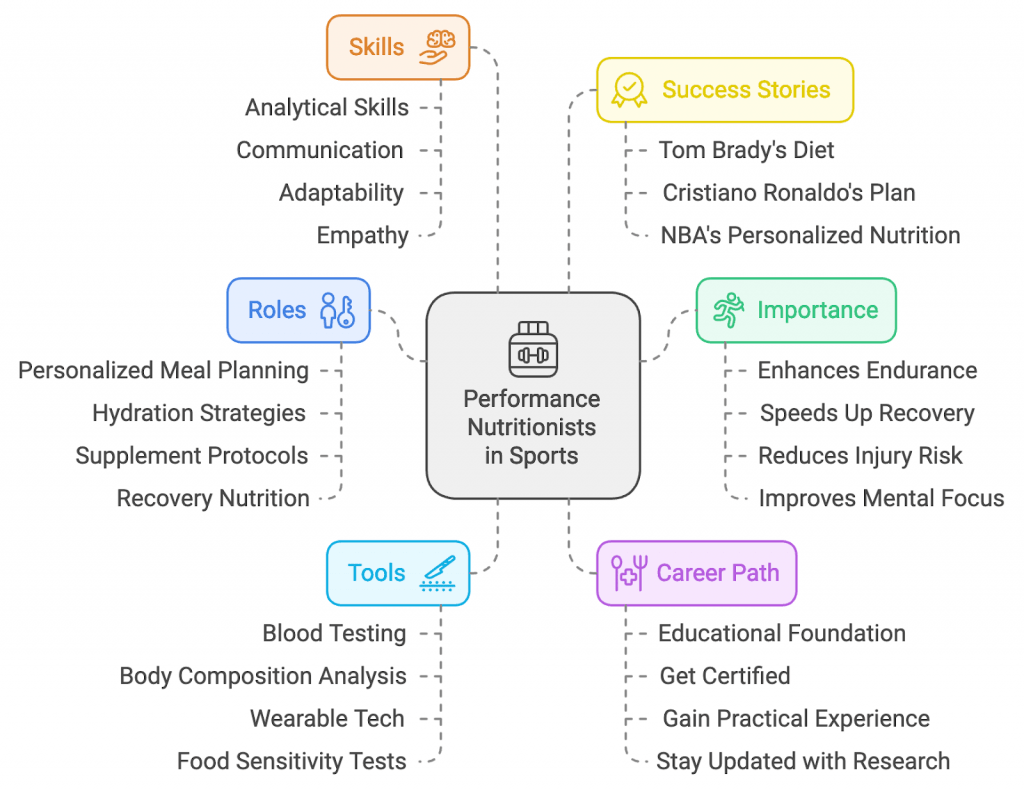Understanding the Role of Performance Nutritionists in Professional Sports
In professional sports, where every millisecond counts and peak performance is everything, nutrition is no longer just about “eating healthy.” Enter the performance nutritionist – the expert aiming to fuel athletes precisely. Performance nutritionists tailor diets, hydration plans, and supplement routines to help athletes reach their physical and mental peaks. Want to know how they do it? Let’s break down what performance nutritionists bring, why they’re critical in sports, and how they help athletes push boundaries.
What Exactly Does a Performance Nutritionist Do?
A performance nutritionist is like an athlete’s personal food scientist. Their main job is to create custom meal plans, hydration schedules, and supplement protocols tailored to each athlete’s body, goals, and sports demands. This isn’t just about eating vegetables and drinking protein shakes – it’s a specialized field.
For instance, performance nutritionists working with marathon runners will focus on long-lasting energy sources and endurance support. But if they’re working with a sprinter, the nutritionist might prioritize quick energy bursts and muscle recovery. Performance nutritionists need to know the ins and outs of each sport to fuel athletes accordingly.
Why Performance Nutrition Matters
Nutrition has always been a part of sports, but now, it’s on a new level. With scientific advancements, nutritionists can fine-tune diets to a once unimaginable degree. Proper nutrition can enhance endurance, speed recovery, reduce injury risk, and improve mental focus.
Imagine a basketball player trying to recover from back-to-back games. A performance nutritionist will create a plan focused on anti-inflammatory foods, proteins, and hydration strategies to accelerate recovery. In a world where small gains make all the difference, these personalized diets give athletes an undeniable edge.
Key Responsibilities of a Performance Nutritionist
Let’s look at the daily duties of a performance nutritionist to understand how they keep athletes fueled and ready for peak performance.
- Personalized Meal Planning: Performance nutritionists craft meal plans aligning with an athlete’s needs. For example, a UFC fighter’s diet will be high in protein and tailored to maintain muscle mass while cutting weight for fights. On the other hand, an endurance athlete’s plan might focus more on complex carbs and timed refueling.
- Hydration Strategies: Hydration is often more nuanced than just “drinking water.” Nutritionists use tools like electrolyte testing and sweat rate analysis to determine how much and what type of hydration an athlete needs. They might recommend specific electrolyte supplements or tweak hydration based on climate and altitude.
- Supplement Protocols: Not all supplements are created equal, and nutritionists ensure athletes take only what’s necessary. For instance, a soccer player might take beta-alanine to reduce muscle fatigue, while a weightlifter may focus on creatine for explosive power. Performance nutritionists also ensure that all supplements comply with league regulations to avoid unintentional doping violations.
- Recovery Nutrition: Recovery is essential in sports. Nutritionists work on post-game or post-training meals that replenish glycogen stores, reduce muscle soreness, and speed up recovery. Athletes like LeBron James and Cristiano Ronaldo are known to have post-game recovery shakes designed by their nutritionists to help them bounce back quickly.

How They Work with Other Staff
Performance nutritionists don’t work in a bubble; they’re often part of a larger team that includes coaches, strength trainers, and sports psychologists. They collaborate closely with these experts to align nutrition with training and mental conditioning. For example, if a strength coach plans a high-intensity workout week, the nutritionist might increase protein and caloric intake to match the energy expenditure.
At clubs like the LA Lakers and Real Madrid, nutritionists, strength coaches, and physical therapists work together to create a fully integrated approach to athlete care. This teamwork ensures that athletes get consistent advice and support across all performance areas.
What Nutritionists Use to Get the Job Done
Gone are the days of guessing when it comes to sports nutrition. Today’s performance nutritionists use cutting-edge tools to monitor athletes’ bodies and fine-tune their dietary needs. Here’s a look at some of the tools in a nutritionist’s arsenal:
- Blood Testing: This helps monitor nutrient levels, identify deficiencies, and ensure athletes absorb what they require.
- Body Composition Analysis: Using tools like DEXA scans, nutritionists can determine the athlete’s muscle-to-fat ratio and adjust diets accordingly.
- Wearable Tech: Devices like the WHOOP strap and Garmin watches track metrics like heart rate variability and sleep, allowing nutritionists to adjust recovery meals or hydration plans based on real-time data.
- Food Sensitivity Tests: For athletes dealing with digestive issues, food sensitivity tests can help identify foods that may be causing inflammation or discomfort, allowing the nutritionist to tweak diets for optimal digestion.

Real-Life Success Stories in Performance Nutrition
To truly understand the impact of performance nutrition, let’s take a look at how some big names in sports have used nutrition to stay on top of their game.
- Tom Brady’s Plant-Based Diet: NFL star Tom Brady has famously adopted a largely plant-based, anti-inflammatory diet crafted by his performance nutrition team. His diet focuses on foods that reduce inflammation, helping him extend his career well into his 40s in a sport that demands physical resilience.
- Cristiano Ronaldo’s High-Protein Plan: Ronaldo’s performance diet is rich in lean proteins, whole grains, and vegetables. His nutritionist also includes regular “snack meals” to maintain high energy levels, especially on match days. This meticulous diet helps him maintain speed, agility, and strength as he competes at the highest levels of international soccer.
- The NBA’s Shift to Personalized Nutrition: Over the past decade, many NBA teams have hired full-time performance nutritionists to help players manage everything from game-day meals to travel diets. Teams like the Philadelphia 76ers have implemented strict guidelines that include low-sugar, high-protein diets to keep players in peak condition throughout the season.
How to Become a Performance Nutritionist
If this career sounds exciting, here’s how you can get started:
- Educational Foundation: Start with a degree in nutrition, dietetics, sports science, or a related field. Programs like Texas A&M’s Sports Nutrition program or the University of North Carolina’s Applied Nutrition program are excellent places to gain foundational knowledge.
- Get Certified: Certifications like Certified Sports Nutritionist (CISSN) or Registered Dietitian (RD) can boost your credibility. These certifications often require hands-on experience and exams, but they set you up as a qualified expert.
- Gain Practical Experience: Work with athletes, even if it’s at the local gym or college level. Internships with sports teams or performance centers can give you the needed experience and help you build a network in the industry.
- Stay Updated with Research: Nutrition is constantly evolving, especially in sports. Following publications like The Journal of the International Society of Sports Nutrition or attending seminars hosted by groups like Gatorade Sports Science Institute can inform you about the latest research and trends.

Key Skills for Success
Being a performance nutritionist isn’t just about knowing what to eat – it’s about understanding athletes and their needs. Here are some skills that make a great performance nutritionist:
- Analytical Skills: You need to interpret lab results, body composition data, and performance metrics to adjust meal plans.
- Communication: Explaining the “why” behind each dietary decision is crucial. You’ll need to communicate effectively with athletes and coaches.
- Adaptability: Athletes’ needs change throughout the season, so you have to be ready to adjust diets and hydration plans based on training, travel, and even weather conditions.
- Empathy: Working with athletes is about more than science – understanding their mental and physical struggles and supporting them through nutrition.

Final Thoughts
Performance nutritionists are more than just meal planners; they’re essential members of the sports performance team, giving athletes the fuel they need to push limits and break records. With science-backed plans and personalized strategies, these experts are changing how athletes prepare, recover, and perform.
If you’re passionate about sports and science and want to help athletes succeed, this career might be your perfect match. So, gear up, grab that nutrition degree, and prepare to make a real impact in professional sports!



